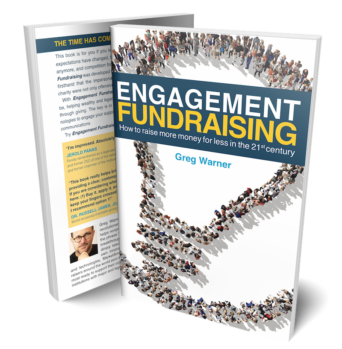We use cookies to ensure that we give you the best experience on our website. By continuing to use this site, you agree to our use of cookies in accordance with our Privacy Policy.
 Login
Login
Your Role
Challenges You Face
results
Learn
Resources
Company
6 Reasons Why Donor Surveys Work at Engaging Wealthy Supporters and Prospects


Getting that initial engagement from a major donor prospect is a big hurdle. Yes, we all want to meet with donors, have great conversations, build relationships, and win big gifts. But getting started with new prospects isn’t easy. How do you get your foot in the door? As you’re about to see, donor surveys are about the best, smartest, and most effective tool at engaging new and not-yet-qualified major donor prospects.
Why do surveys work so well at this?
Because the kinds of people you’re trying to reach out to already know your organization. They probably like it. They may have donated to it already in smaller amounts. They may have volunteered. Your mission and cause may mean a great deal to them.
But you?
Who’s this person calling me unsolicited and unannounced?
As a gift officer or outreach administrator, you are a total stranger to them.
Surveys are thus the perfect ice-breaker because they are easy, convenient engagement offers that give supporters control. As a result, they prevent you from seeming like a telemarketer. Rather, they make you an invited guest instead of an unwelcome pest. Plus, surveys enable you to become an invited guest, when the time is right.
Logistically, surveys are also relatively easy to deploy. They can be mailed out as a letter, sent via email, posted on social media, offered in your publications, or presented on your website. See strategies to increase survey response rates.
The key to successful donor surveys is this:
You must truly want their feedback. A survey cannot be a ruse to get data for research or to ask for money. As the saying goes, if you want money, ask for advice; if you want advice, ask for money. Good ask for advice because you intend to listen sincerely. If you only use the information submitted for research purposes (instead of for continuing the conversation) then surveys will fail to enhance the donor experience and your donors will stop giving.
So, let’s look at 6 reasons why donor surveys work so well at initializing and deepening relationships between high value supporters and nonprofits.
1. Donor Surveys Connect Identity with Mission
People who care about a cause want to help further the mission of that organization. They are looking for ways to help. Good donor surveys make them feel like they’re doing that.
A survey lets the donor prospect give their input and advice. It lets them participate in solving a problem. If they have expertise, a survey can allow them to use it to further a cause that matters to them.
All of this is extremely valuable. Not only do you get helpful solutions and input for a real problem you want to tackle, but you also bond your organization with all the people contributing to the survey.
The donor surveys we’re talking about here aren’t about demographics. The primary goal of these surveys is to obtain highly valuable qualitative data. This is the kind of data you can’t get from wealth screeners and databases. It enables you to personalize your outreach and communications with each individual prospect.
You can use surveys to determine things like:
- Why the supporter cares about your mission
- Which aspects of your mission they care most about
- Who influenced them in their life to care about this
- How they rank your cause compared to others they support
- Where they reside in their consideration continuum for giving
- What assets or instruments they are considering using to give
- Etc.
2. Surveys Help the Donor Self-Reflect
Self-reflection is powerful. This is what leads to big decisions, shifts, new directions, new ideas, and new passions. And donor surveys facilitate self-reflection for your major donors and prospects.
When you ask questions about their values, life history, experiences related to your mission and cause, and people who have influenced them, the prospect experiences new levels of self-discovery that helps them advance. You are truly providing something valuable to them as they reflect on their life and what matters to them. And this benefits your organization because now, the prospect is beginning to define a personally meaningful victory, and how that might look for their life.
Because you are at the center of this self-reflection process and your mission is at the heart of it, a big part of that personally meaningful victory will likely include making a big gift to your organization.
3. Surveys Set the Stage for a Meeting
The best possible setup for a donor meeting is when the donor asks for one.
The best donor surveys make this possible. At MarketSmart, our automated Engagement Fundraising System sends out a steady stream of relevant surveys, along with other content, at the right timing. Over time, the goal is to help a prospect to eventually signal their interest in meeting with someone from your organization. Or, help them arrange a meeting with you using an online appointment setting tool that can be employed as part of the System.
With well-timed and well-designed surveys, you can learn things about each donor prospect that enable you to customize your outreach and the timing for it. Before you meet with a donor, you will know information such as:
- Where the donor is in the consideration process for giving
- If the donor wants to gain a meaningful victory by donating assets rather than cash
- How much the donor’s life history plays a role in connecting them with your cause
- Which of the donor’s values, if any, align strongly with yours
- Specific projects or areas of impact a donor wants to support so they can gain a personal victory
- Interest in legacy giving and the permanence of a bequest
- If the supporter has a family foundation or DAF that competes with your organization’s value proposition
- How your organization ranks compared with others supported by the prospect
Imagine knowing information at this level before having a meeting with a prospect!
All the dead ends and rabbit holes you’ll avoid. All the awkward silences you’ll miss out on. When you know what a donor already cares about, has interest in, and wants to hear about, you don’t have to waste time trying to discover all this in a meeting.
And when you already know something about the financial assets of the supporter, you don’t have to fumble around trying to get them to talk about it. For example, what are some assets people can donate instead of cash? One prospect may have an IRA and some real estate, and another may have company stock and some crypto. Each of these invite very different possibilities for how they might want to use those assets in the future.
When you know this information ahead of time, you will have a richer discussion, and you will be able to craft a more personalized and appealing set of options when the time comes to discuss a major gift.
4. Surveys Can Alter the Giving Reference Point
Far too many donors, even wealthy ones, have become accustomed to low-dollar solicitations and invitations, because they get the same mass mailings as everyone else, and see the same commercials.
But a survey can help reposition the idea of giving in their minds. It can help shift them back up to a higher giving category, one more befitting of their potential. A survey can make it feel more reasonable, in their minds, to make a larger gift.
In his book titled The Socratic Fundraiser, renowned charitable giving researcher Dr. Russell James describes this as altering their “mental accounting.” The survey achieves this because the prospect is freely engaging with it, without coercion, and because it is generating self-reflection and self-discovery, as discussed earlier.
5. Surveys Teach and Inform
Some surveys might relate to a specific project, initiative, or upcoming campaign. Remember – the best surveys go out because you really do want the advice of the person receiving it and you’re prepared to prove it by following up with personalized cultivation
You might ask their opinion or advice regarding a big project. Well, to answer questions about that, the prospect has to learn something about the project. This overcomes one of the biggest hurdles in all types of marketing – getting the person to engage with the content and the details. Because you need their advice, they now care about this enough to learn about it. And in learning about it, they will begin to care about it even more, which can lead to major gifts down the road.
Or, suppose you ask them to rank their likelihood of making a major gift someday, or to rank the organizations they support in order of importance.
Each of these questions requires them to contemplate their priorities, values, finances, future, and the impact they want to have on the world. They are educating themselves about the issues you need them to have thought about in order to have a productive meeting at some point in the future.
That’s a big win.
6. Surveys Can Prompt Follow-Up
We’ve already talked about how surveys can result in the prospect requesting a meeting, or at least signaling that they are open to being contacted about one.
This is powerful stuff, because it means they want to engage more deeply, and you already know this is true before the very first meeting. That meeting will be starting at a point much further upstream compared to other meetings where all you know is what you read on a wealth screener and a spreadsheet with their demographics and giving history.
Raising their hand in this manner means they are ready to initiate a deeper relationship with you as their counselor and guiding sage.
But surveys can also generate other forms of follow-up.
For example, you might discover areas of expertise the supporter can use in some capacity at your organization. You might find a person ready and waiting to volunteer. You may unearth a new board member.
They might ask for more information about something like particular methods of giving, or the tax benefits of donating assets vs cash.
Any follow-up that is asked for will be more effective than unsolicited follow-up. That’s not to say you shouldn’t be doing both types, only that a receptive audience always beats a cold one.
How to Increase Survey Response
So now you have a good sense of why donor surveys work so well at increasing engagement and generating major gifts.
But how do you get them to fill out the survey in the first place?
Read this to discover how to increase survey response
Related Resources:
- How to build deeper connections with your donors using surveys
- The Importance of Asking Permission to Ask More Questions
- Finally, the questions you should ask that have been proven to lead to gifts from wealth
LIKE THIS BLOG POST? SHARE IT AND/OR LEAVE YOUR COMMENTS BELOW!
Get smarter with the SmartIdeas blog
Subscribe to our blog today and get actionable fundraising ideas delivered straight to your inbox!
